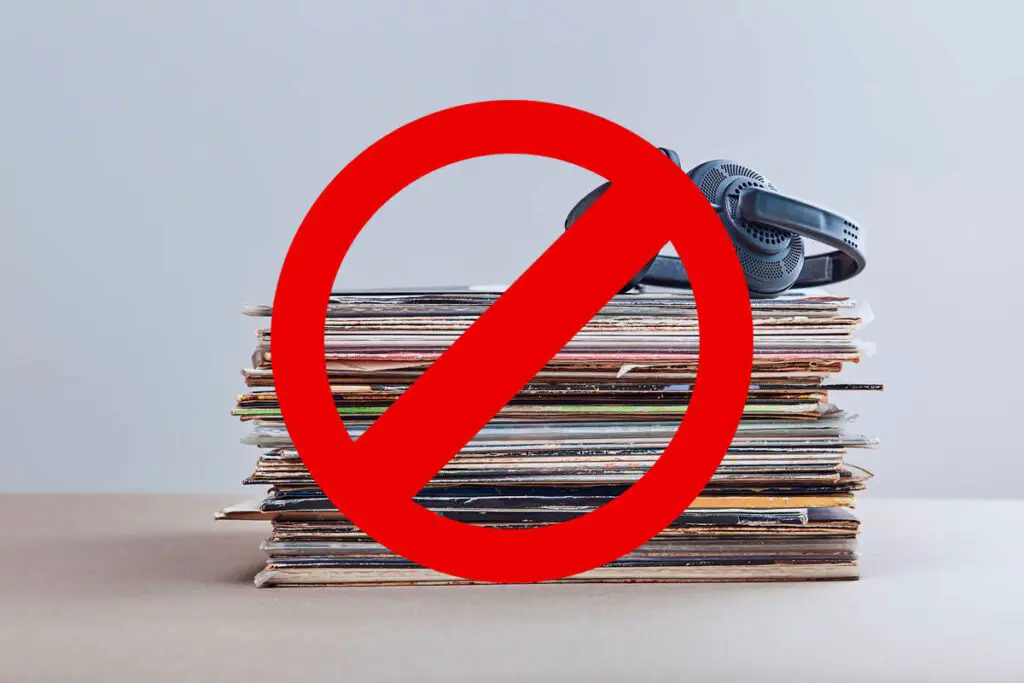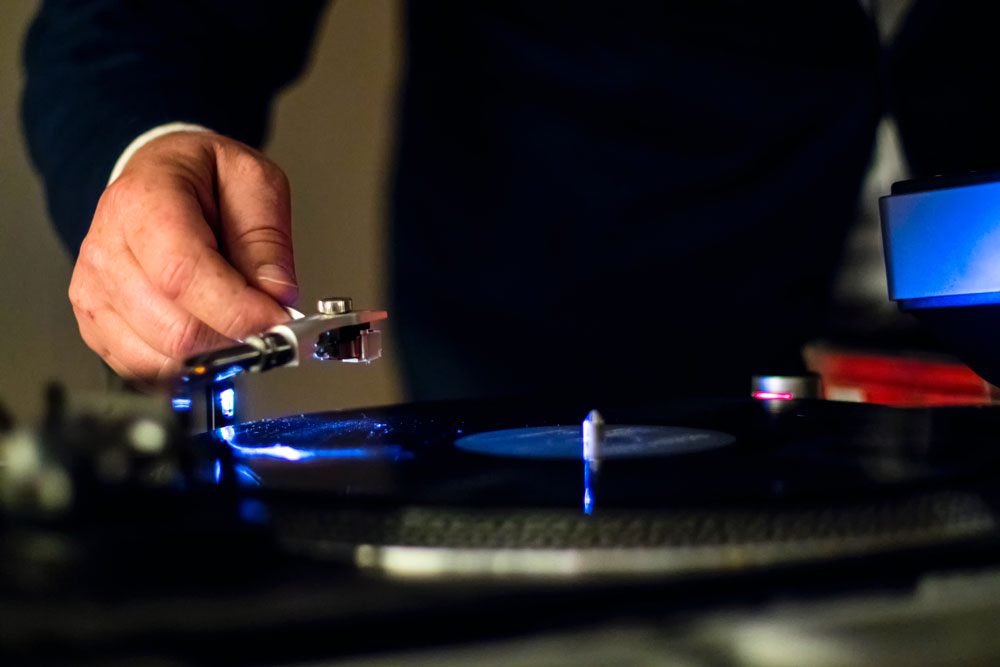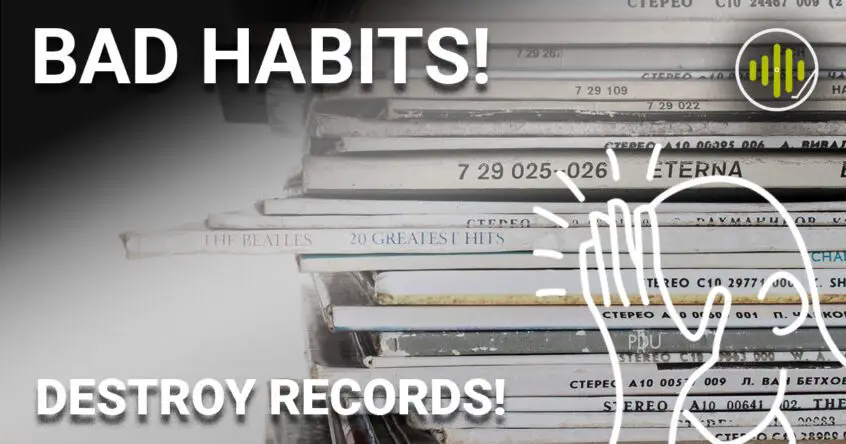Getting the best possible sound from any vinyl record collection requires a significant amount of discipline.
Unlike digital music, it requires lots of time and maintenance to keep the music flowing and the sound quality sharp.
As vinyl collectors, we like to think we possess the patience necessary to reap the rewards – but come on, be honest, you’ve been guilty of at least one of these bad habits… at least once…
1. Touching the record surface
Let’s start with the basics: touching the record surface is a big no-no. Our hands contain natural oils, grease, and dirt – none of which we want anywhere near our records. This grime builds up over time, compounding dust and dirt while also contributing to stylus wear.
Always handle your records by the outer edge. If you do accidentally touch the record surface, it’s best to clean the record immediately before playing or storing. Cleaning by hand using a record cleaning solution will suffice for minor record handling; if you suspect the record was handled quite a lot, you might want to use a record cleaning machine or repeat the hand cleaning process a few times for the best results.
Read our full guide on how to handle vinyl records.

2. Stacking your records
Stacking records horizontally is a common bad habit that, in extreme circumstances, can render a record virtually unplayable. Horizontal record stacking applies excess weight to your records that can lead to warping and damage to the record sleeve (anyone who’s ever purchased used records will recognize the all too familiar sign of ring wear that occurs from horizontal stacking).
Always store your records vertically and avoid any excess pressure from leaning or overpacking the storage cabinet.
To learn more about storing records correctly, check out our previous article on how to store vinyl.

3. Leaving your records out
This one should be a given, but we all know someone guilty of this one. Ideally, the only time your record should be out of its sleeve is when you’re playing the record.
Any extended time outside the sleeve — be it left on the platter, or worse still, on a side table — will subject the record to dust and significantly increase the risk of damaging the surface…. Come on, you know this one really — just put the record back, it only takes a few seconds.

4. Carelessly returning the record to its sleeve
When putting your records away, it’s often tempting to let records drop as they enter the sleeve, but this can lead to damaging both the record and the sleeve.
At best, you’ll quickly punch a hole in the bottom of the sleeve – rendering it useless.
At worst, you’ll scratch and scuff the surface. Always open the sleeve wide enough to reduce contact with the record and gently feed the disc in without touching the grooves.
5. Bad cleaning practice
Search “how to clean vinyl records” on YouTube, and you’ll quickly encounter some questionable methods.
From using household cleaning products (such as Windex) to advocating highly abrasive home-made concoctions (the infamous wood glue method comes to mind), there are plenty of recommendations that will quickly render your precious records useless.
Vinyl records are delicate products made from polyvinyl chloride (essentially posh plastic). Any change to the material’s surface (either chemically or through physical abuse) will have a huge impact on those tiny microscopic grooves.
If you really must make your own cleaning solution, be sure to use only clean, distilled water as your primary ingredient. (Better still, use a tried and tested record cleaning solution).
Tap water contains impurities that will quickly build up in the record grooves. The area I live in is particularly bad for lime-scale — if I were to use tap water to clean my records, it wouldn’t take long before they were about as useful as my lime-scale-ridden kettle!
Check out our guide on how to clean vinyl records for further advice on this topic.
6. Cueing up records with your hand
You should always use the cueing lever to lower and raise the tone arm – particularly when lining up tracks mid-way through a side. If you skip this step and go straight in with your hand, it’s only a matter of time before you slip and damage your records or stylus shank.
In an ideal world, you should play the entire record from start to finish to avoid potential damage when cueing up individual tracks. However, using the cueing lever will help minimize risk by allowing you to lower the stylus in the silence between each track gently.
When the track ends, it’s important to wait until the track completely stops before gently raising the stylus with your cueing lever.
Check out our guide on playing a record to learn more about safe turntable operation.

7. Not waiting for the record platter to STOP
Picking up your records from the turntable platter before it stops spinning is a sure way to scratch the other side of your wax.
You might be eager to flip your favorite album and continue enjoying the music, but a little patience goes a long way. Good things come to those who wait, as Guinness once proclaimed.
8. Not Changing Your Stylus Regularly
Nothing will destroy records faster than a worn or damaged stylus. Despite most styli being made from diamond (the hardest surface known to man). They do wear out and need replacing periodically.
If you keep your records and stylus clean, they can last quite a long time. On average, a turntable stylus/needle will last up to 1000 playing hours. For the average listener, this equates to around 1500 album plays.
Failing to replace the stylus regularly will result in poor sound quality, but worst of all, the mis-shaped stylus will cause groove wear and predominately damage your records. I make a habit of changing my stylus once every year as a matter of caution.
Got a bad vinyl habit bugbear you’d like to add? Pop it in the comments below.




$500 for a new stylus… Don’t think i’ll be changing it out every year.
Static is your enemy…
Buy anti-static inner sleeves. The usual paper ones are rubbish.
Use an anti-static comb/brush every time before even dropping the needle.
I display mine on wall mounted stands, and the records lean at about a 3-5 degree angle so its not much. Is this still a risk of damaging them? Im thinking of getting cardboard backing to keep them straight, will that help?
kinda silly question: why can a DJ touches the grooves? is the vinyl that DJ use any different?
nope. a dj is infinitely damaging a record, but who really gives a crap? it’s their records, haha.
I am an above elbow amputee so I can’t hold the record between two hands. I attempt to pinch it on the very edge (the dead intro wax), although it doesn’t always work. Does anyone have a method that will be better for me to use?
I saw a guy using suction cups meant for glass in a video to clean records. Might be workable?
Record cleaning tools e-book will not download.
Another (obvious) one for the list. -Don’t let them get dusty. In other words, play them. They can get dusty sitting on the shelf. Dust is never good.
You can still be a beat mixing DJ and handle records carefully. I’m proof positive. My records are in better condition than most non-DJs I know. I’d I’ve spun “Bizarre Love Triangle” less than 500 times I’d be suprised, and it still looks and sounds great, even in the dead space. I’m probably the only DJ who vacuumed his slipmats weekly.
Every time you play a record you damage it. Dragging a diamond through plastic is a destructive process. Vinyl junkies are chasing the plastic dragon. If you cant handle that then listen to CDs whoch were invented to address the deterioration problem.
No, that’s not really true. I have records i bought in the 60’s and 70’s (and since then) that are fine. If the arm is set accurately it is only just floating through the groove, not gouging it’s way around..
CDs do deteriorate over time
Ravi Shankar has a soundtrack LP on Apple label, “Raga” at the end of the record he says, “Sound is God”. he is referring to the drone sound of the sitar and such, I say, LP damage is the devil.
[…] you want to keep your vinyl records in pristine condition, you must handle your collection with care. Washing your hands is essential before touching your […]
DJing inevitably involves breaking some of these rules; for instance, when you’re beat matching it just isn’t feasible to place the stylus with the tone arm lever, to say nothing of the damage done by back spinning. But if you keep them in mind you can at least reduce the harm you cause. You can always handle records at the edges, even when cueing them up. Good slipmats can help reduce friction on the side of the record not being played when cueing and back spinning; some DJs cut a plastic inner sleeve to the shape of the slipmat and place it between the mat and platter for extra slip. It’s a tall order to ask a DJ to stop the platter entirely every time before placing and removing records, but it can be done by using your hand against the side of the platter to halt its motion once you hit the stop button. It’s the rare DJ who, with the floor moving and the adrenaline up, will have the presence of mind to do all this. It’s worth trying, though. I have tons of records from my DJ days that I wish I’d taken better care of.
Eh? These rules only apply to someone who is NOT a DJ, correct?
Sorry. Most of these rules I should say. Great article.